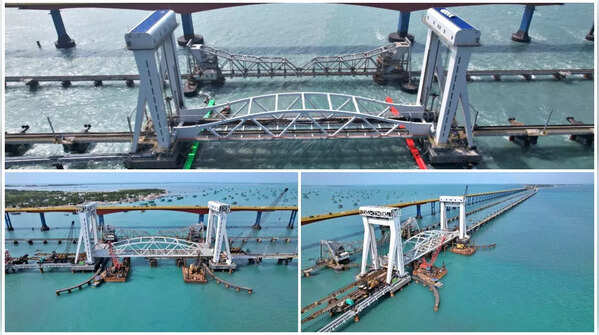- News
- Business News
- India Business News
- New Pamban Bridge, India’s First Vertical Lift Sea Bridge Of Indian Railways, Inaugurated By PM Modi: Top 10 Facts & Photos You Shouldn’t Miss
New Pamban Bridge, India’s First Vertical Lift Sea Bridge Of Indian Railways, Inaugurated By PM Modi: Top 10 Facts & Photos You Shouldn’t Miss

New Pamban Bridge - India’s First Vertical Lift Sea Bridge: Top 10 Facts
Pamban bridge, India’s first vertical lift sea bridge, was inaugurated by PM Narendra Modi on April 6, that is on Ram Navmi. PM Modi flagged off the Rameswaram-Tambaram Express, which then crossed the new Pamban bridge for its inaugural run. Built by the Rail Vikas Nigam Limited to replace the now defunct old Pamban bridge, the new Pamban bridge is unique in many respects. Importantly, it re-establishes railway connectivity to Rameshwaram island. The new Indian Railways bridge is an engineering marvel, and its beautiful photos will leave you awestruck!From top facts such as location, length, salient features to stunning photos - here’s all you should know about the new Pamban bridge:

Pamban Bridge Unique Feature
Pamban bridge unique feature: The distinctive feature of the newly constructed Pamban bridge is its vertical lift mechanism, enabling ships to navigate underneath effortlessly. Pamban bridge is India’s first such bridge.

Pamban Birdge: Navigational Span
The new Pamban bridge has a 72.5-metre navigational span that elevates to 17 metres, to help accommodate the ship traffic beneath. It has been 3 built metres higher than its predecessor.

Pamban Bridge Operation
Pamban bridge operation: All railway movement will be halted when ships need to pass beneath the Pamban bridge's vertical lift segment. The navigational section elevates vertically to provide sufficient clearance for boats to pass through.

Pamban Bridge Length
The new Pamban bridge is 2.07 kilometres long, extending across the Palk Strait in Tamil Nadu. The substructure supports two railway tracks, whilst the upper structure currently serves a single line.

Pamban Bridge Train Schedule
Rameswaram-Tambaram (Chennai) train service will run on the new Pamban bridge. For regular operations, train number 16103 will depart from Tambaram at 6:10 PM to reach Rameswaram at 5:40 AM the next day. In return, train number 16104, will leave from Rameswaram at 4:00 PM to reach Tambaram at 3:45 AM the next day.

Pamban Bridge Location
Pamban Bridge Location: Situated in Tamil Nadu's Ramanathapuram district, the newly constructed Pamban rail bridge now establishes a train link between Rameswaram or Pamban island and Mandapam on the mainland.

Pamban Bridge Construction Challenges
New Pamban bridge construction: The construction faced significant challenges due to the harsh conditions in the Palk Strait. The volatile sea conditions, forceful air currents and erratic climate posed substantial obstacles. The area's vulnerability to cyclonic storms and earthquakes demanded meticulous engineering considerations and sturdy structural implementation.

Higher Train Speeds
Indian Railways' new Pamban Bridge aims to deliver: enhanced transportation to support to increase rail traffic and run trains at higher speeds and allow for maritime integration to facilitate passage of bigger ships without interruption.

Pamban Rail Bridge Train Speed
The new Pamban Bridge represents a significant advancement over the earlier structure, with its capability to support train operations at speeds reaching 160 kmph, according to RVNL. This is a substantial improvement from the previous bridge's limit of 10 kmph. However, operational limitations due to signalling systems and track curvature will restrict actual train speeds to 80 kmph.

New Pamban Bridge Lifespan
The new Pamban bridge has a lifespan of 100 years and with special engineering practices used, it requires reduced maintenance. The project, approved in 2019, required an investment of approximately Rs 550 crore.

Pamban Bridge Engineering Marvel
Pamban Bridge Engineering Marvel: Advanced construction materials and engineering methods ensure structural durability. The construction incorporates stainless steel reinforcement, superior-grade protective paint and fully welded connections. The vertical lift section incorporates an electromechanical control system that is integrated with the train control operations.

New Pamban Bridge Special Facts
New Pamban bridge special facts: A specialised polysiloxane coating shields the structure from corrosive elements. This aims to ensure sustained longevity for the new Pamban bridge in extremely challenging maritime conditions.

Old Pamban Bridge
In 1914, British engineers constructed the original Pamban Bridge. The old Pamban bridge utilised the Scherzer's Span, which required manual operation. The Scherzer's Span (named after the bridge's engineer) consisted of a 61 metre steel truss that rotated upwards to a maximum angle of 81 degrees to accommodate boat passage.
Due to safety concerns, the old Pamban bridge has been shut for rail traffic for some years now. (Image of old Pamban bridge)








